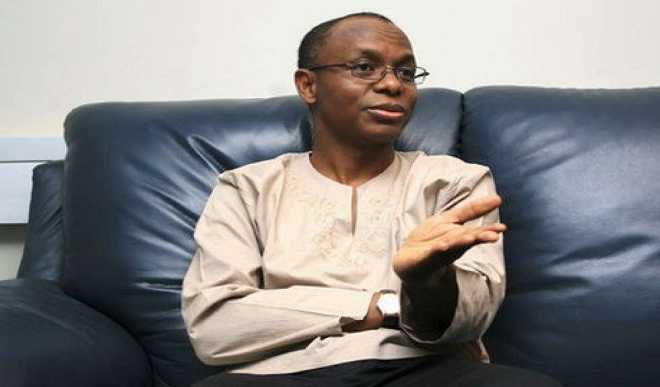
I am [or was] a fish biologist by training and every now and then, Kaduna State Governor Nasiru el-Rufa’i reminds me of a fish called the muckraker. This fish swims close to the bottom of brackish rivers, raking up muck as it goes in order to find food. Its biological name is Gobionellus stomatus; sub-family Gobionellinae, family Gobiidae, order Perciformes, sub-class Actinopterygii, class Pisces, sub-phylum Vetebrata, phylum Chordata, kingdom Animalia. Phew! I am rehearsing in case El-Rufa’i is setting a UG 1 competency test for me.
In Nigeria, governors in their first terms in office usually operate according to the Let My People Go principle and they only reveal their true character when they enter their second terms. Not Nasiru el-Rufa’i. In two and a half years as governor he has raked up every muck there is in Kaduna State including houses that encroached on schoolyards, clerics who blare their message on cassettes, couples that marry without health certificates, folks who feed on government’s Ramadan food, journalists who fabricate stories and politicians who are too impatient to wait for 2019, whom he advised to jump off Kufena rock.
The latest muck El-Rufa’i raked up, a Kaduna State Teachers’ Competency Test that exposed the severe incompetence of majority of the state’s public school teachers, has already raked enough muck to blur the vision of River Kaduna crocodiles. 33,000 teachers sat for the exam and 21,000 of them failed. The state government wants to sack them and recruit 25,000 better qualified replacements. Already, pupils have demonstrated in the streets asking the government not to sack their teachers; the state government warned teachers and politicians to stop using kids as cannon fodder and President of the Nigeria Labour Congress [NLC] Ayuba Wabba has promised to shut down Kaduna unless KDSG rescinds its plan. NLC is not mollified that 25,000 qualified teachers will be recruited to replace the sacked ones because it represents current workers, not future ones.
KDSG was on the verge of losing the argument on this matter. Most Nigerians thought it was callous to sack 21,000 teachers in these days of jobs drought, economic recession, high inflation, unpaid salaries and endless verifications. Most workers live on poverty’s sharp edge and sacking so many thousand workers could imperil their lives and could cause social unrest. However, KDSG then released some scripts from the test for Nigerians’ viewing pleasure. It was a monumental scandal, that is, to anyone who values education more than jobs.
Leaking of the scripts made many people to pause and reflect. The education sector, by far the most elaborate and most budget guzzling sector of the Nigerian public service, is meant to socialise the next generation and impart knowledge to them. What does it mean when two thirds of the teachers in one state are shown to lack the most basic literacy, numeracy and general education? How do you impart what you don’t have? Kaduna State is quite cosmopolitan; what happens when this same test is administered to teachers in more rural states?
I am not a trained educationist but I was a teacher for eight years, one NYSC year in a secondary school and seven years at university level. When the University of Sokoto [as it was then called] recruited us as graduate assistants, it decided that those of us who had no training in education needed to know a few things about teaching. It therefore brought an expert teacher from UK, Prof Eric Hall, who did a two weeks’ crash course in teaching. On the first day of the course he said, “Teaching is explaining. Before you start explaining, make sure that the matter is clear in your mind. If it is not clear in your mind, it will never be clear in the mind of the student.”
The Kaduna competency test demonstrated for all to see that for many years, in fact for many decades, the teaching service was a dumping ground for people who were barely literate. It reminds me of a story that one time Daily Trust columnist Hajiyaye Liman told in her column about her short visit to her hometown in, I think, Adamawa State. She said people regularly paid bribes to LGA officials to get job opa [offer] for their children. Such offers were given without the slightest regard to basic qualification. Teaching was also seen by all and sundry as the lowest of all jobs. Hajiyaye said a certain woman asked her to use her influence and secure a job for her daughter “ko teaching ne” [even if it is teaching]. She said the daughter was barely literate but the mother still thought that teaching was beneath her daughter’s dignity. What we saw in the Kaduna competency test is the culmination of years if not decades of this practice.
In the leaked scripts, one teacher wrote the name of the Commissioner for Education as Prof Andrew Knock. Sure that is how the name Nok sounds on people’s lips and on radio, but the teacher has apparently never seen it written anywhere. That is because he or she does not read the newspaper, not to mention magazines, novels, journals or books. Self improvement or even simple good citizenship have long been ousted from their minds.
Deterioration in quality occurred in most other sectors of the public service but apparently not to the same level as in education. For example, if the health service had been stuffed with doctors and nurses of similar quality, there would have been a howl of protest from the public because the effect would have been instantaneous. Today, the discovery of even one quack medical doctor elicits howls of protest from the public, but not the discovery of a quack teacher who is teaching the doctors of the future. The same thing applies to engineering. If the Ministry of Works were stuffed with quack engineers and surveyors our roads, bridges, culverts and houses would have been falling apart every day and the public outcry would have been instantaneous.
Why is our attitude to quackery different when it comes to teaching? Maybe it is because, unlike doctors and engineers, the effects of quackery in education take a generation to manifest. Even though Education Ministries have supervisors, they too are no better than most of the teachers. Parents are supposed to be the real quality assessors. Though we are not in the class to see what the teachers are teaching, it is very easy to assess the quality of what a child is taught because he will come back home singing, emulating the teacher’s words, reading anything he can find and scribbling on the wall. Any parent should ask questions if his child returns from school and does not spoil the house’s fine paint with scribbling.
The teacher is the most important factor in the school system but our newspapers have misled Nigerians by devoting much space to complaining about lack of furniture in public schools. A common newspaper story is “pupils learning under a tree,” which we think is a big scandal. When you think about it, pupils learning under a tree will still pick up something if the teacher is good. It is better to have a good teacher without a good classroom than to have an air-conditioned classroom with a quack teacher. Education regularly gets the lion’s share of each state government’s budget. With this kind of teachers however, we are simply wasting our time and resources, consigning the pupils to a bleak future and consigning the country too to a dangerous future.
For now everyone is concerned about the fate of the 21,000 teachers to be sacked. I am too; I even know some of them. Since government has other social welfare programs it should please accommodate them in those ones.

 Join Daily Trust WhatsApp Community For Quick Access To News and Happenings Around You.
Join Daily Trust WhatsApp Community For Quick Access To News and Happenings Around You.


